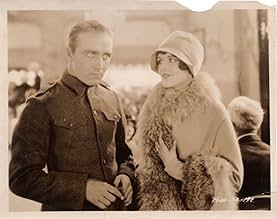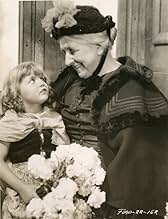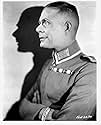Ajouter une intrigue dans votre langueA family saga in which three sons of a Bavarian widow go to war for Germany and the fourth goes to America, Germany's eventual opponent.A family saga in which three sons of a Bavarian widow go to war for Germany and the fourth goes to America, Germany's eventual opponent.A family saga in which three sons of a Bavarian widow go to war for Germany and the fourth goes to America, Germany's eventual opponent.
- Réalisation
- Scénario
- Casting principal
- Récompenses
- 3 victoires au total
Frank Baker
- Soldier
- (non crédité)
George Blagoi
- Officer
- (non crédité)
Stanley Blystone
- Officer
- (non crédité)
Carl Boheme
- Officer
- (non crédité)
Constant Franke
- Officer
- (non crédité)
Avis à la une
The biggest interest point for me seeing 'Four Sons' was John Ford, a truly fine director and a versatile one, doing many films in many different genres. Including from personal opinion the definitive director of the Western genre. Also really liked the subject matter and appreciate silent film hugely, the positive reception to the film also helped. Even if there was the potential trap of it being too melodramatic and over-emotive, though actually it sounded very emotional.
'Four Sons' turned out to be exactly that. While it may not be one of the great director's very best or most iconic films (am most familiar with his films from the 40s and 50s decades), it is one of his best early ones and one of not many to be properly great. 'Four Sons' overcomes all the potential limitations that silent film can have that have eluded quite a few films around this time and to me it was definitely more genuinely emotional than it was overly melodramatic.
Very, very little wrong, though the brothers' reunion on the battlefield did seem too much of a too much by chance coincidence.
However, 'Four Sons' is incredibly well made. Ford's films always did look great, namely in his Westerns with how the photography captured those majestic locations. Even for so early on there is nothing primitive looking here, it is beautifully and atmospherically filmed and really admired the attention to detail in the setting. The farewell to wife scene is one of the standouts of particularly well shot scenes. The music is haunting and has an emotional but not overwrought edge.
Moreover, Ford directs with ease and doesn't seem uncomfortable or uninterested. 'Four Sons' is incredibly moving, of all my recent first time viewings this is easily in the top 3 films that made me weep the most. Hankies and tissues are absolutely needed for the heart-breaking climax, though there is emotional impact throughout without it getting too heavy. The film is always compelling with not a dull stretch.
All the acting is more than fine, Margaret Mann's performance is an affecting powerhouse and should have gotten some award consideration.
Summing up, great. 9/10
'Four Sons' turned out to be exactly that. While it may not be one of the great director's very best or most iconic films (am most familiar with his films from the 40s and 50s decades), it is one of his best early ones and one of not many to be properly great. 'Four Sons' overcomes all the potential limitations that silent film can have that have eluded quite a few films around this time and to me it was definitely more genuinely emotional than it was overly melodramatic.
Very, very little wrong, though the brothers' reunion on the battlefield did seem too much of a too much by chance coincidence.
However, 'Four Sons' is incredibly well made. Ford's films always did look great, namely in his Westerns with how the photography captured those majestic locations. Even for so early on there is nothing primitive looking here, it is beautifully and atmospherically filmed and really admired the attention to detail in the setting. The farewell to wife scene is one of the standouts of particularly well shot scenes. The music is haunting and has an emotional but not overwrought edge.
Moreover, Ford directs with ease and doesn't seem uncomfortable or uninterested. 'Four Sons' is incredibly moving, of all my recent first time viewings this is easily in the top 3 films that made me weep the most. Hankies and tissues are absolutely needed for the heart-breaking climax, though there is emotional impact throughout without it getting too heavy. The film is always compelling with not a dull stretch.
All the acting is more than fine, Margaret Mann's performance is an affecting powerhouse and should have gotten some award consideration.
Summing up, great. 9/10
10finki
This classic John Ford masterpiece has been spoiled by bureaucratic incompentece.
Somebody in 20th Century-Fox has decided to remove the original Movietone soundtrack and replace it with an inappropriate score. it seems that for certain people, the original intentions of director John Ford were no good enough for today. Hence, the film was stripped of its sound... which means that we do not have the film as it was originally intended to be seen.
Even though in most parts of the world, as well here in the United States, most people saw the film in a silent version, the original soundtrack is a crucial element of the film and without it, the experience is incomplete.
A great film, but avoid the DVD until an authentic restored version with the original soundtrack becomes available.
Somebody in 20th Century-Fox has decided to remove the original Movietone soundtrack and replace it with an inappropriate score. it seems that for certain people, the original intentions of director John Ford were no good enough for today. Hence, the film was stripped of its sound... which means that we do not have the film as it was originally intended to be seen.
Even though in most parts of the world, as well here in the United States, most people saw the film in a silent version, the original soundtrack is a crucial element of the film and without it, the experience is incomplete.
A great film, but avoid the DVD until an authentic restored version with the original soundtrack becomes available.
Other than The Iron Horse we rarely see John Ford's silent films. But in viewing Four Sons we can certainly spot a lot of stylistic traces and themes that mark Ford's more well known sound films.
Before The Iron Horse Ford was a director of Grade B westerns mostly starring Harry Carey. After The Iron Horse Ford started doing other kinds of films. A story with a German setting one might think would be unusual for Ford, but you examine it closely this film is as sentimental as any of his Irish films. And Margaret Mann who played the mother of the Four Sons was a harbinger of such later mother characters in Ford films as Olive Carey, Irene Rich, and the grandmama of them all, Jane Darwell.
Watch also how Ford handles the military sequences in both the German and American settings. The cultural differences are there, but the military way is universal. John Wayne is listed in a bit role as an Officer and I think I spotted him during a scene at a railway station where a particularly nasty Teutonic major played by Earle Foxe. Wayne I believe is one of his aides.
The story is a simple one Margaret Mann is a widow with four grown sons in a village in Bavaria. The sons are James Hall, Charles Morton, Ralph Bushman, and George Meeker. Hall has been in communication with a friend in America urging him to emigrate from Germany and he does. Hall does achieve the American dream, opening a successful business, marrying June Collyer and giving Mann her first grandchild. Then World War I comes and that's the rest of the story as Paul Harvey used to say.
Four Sons holds up well even after 80+ years. Mann's trials and tribulations as a mother certainly is a universal theme. And the ending is as happy and sentimental one as John Ford ever devised in any of his films.
Before The Iron Horse Ford was a director of Grade B westerns mostly starring Harry Carey. After The Iron Horse Ford started doing other kinds of films. A story with a German setting one might think would be unusual for Ford, but you examine it closely this film is as sentimental as any of his Irish films. And Margaret Mann who played the mother of the Four Sons was a harbinger of such later mother characters in Ford films as Olive Carey, Irene Rich, and the grandmama of them all, Jane Darwell.
Watch also how Ford handles the military sequences in both the German and American settings. The cultural differences are there, but the military way is universal. John Wayne is listed in a bit role as an Officer and I think I spotted him during a scene at a railway station where a particularly nasty Teutonic major played by Earle Foxe. Wayne I believe is one of his aides.
The story is a simple one Margaret Mann is a widow with four grown sons in a village in Bavaria. The sons are James Hall, Charles Morton, Ralph Bushman, and George Meeker. Hall has been in communication with a friend in America urging him to emigrate from Germany and he does. Hall does achieve the American dream, opening a successful business, marrying June Collyer and giving Mann her first grandchild. Then World War I comes and that's the rest of the story as Paul Harvey used to say.
Four Sons holds up well even after 80+ years. Mann's trials and tribulations as a mother certainly is a universal theme. And the ending is as happy and sentimental one as John Ford ever devised in any of his films.
In Germany, at the dawn of World War I, widow Margaret Mann (as Frau Bernle) is blessed with "Four Sons" - strapping soldier Francis X. Bushman Jr. (as Franz), dreamy rustic James Hall (as Joseph), handsome metalworker Charles Morton (as Johann), and fair-haired shepherd George Meeker (as Andreas). And, she makes the best honey-cakes in Bavaria. With one son serving the Fatherland, and two more about to join him on the battlefield, Ms. Mann arranges for adventurous Mr. Hall to emigrate to democratic America. There, he opens a delicatessen and marries sweet, beautiful June Collyer (as Annabelle). Eventually, the Great War results in multiple brother tragedies, testing old mother Mann's ability to count her blessings.
The last years of the "silent film" era produced an avalanche of stunning motion pictures; in hindsight, you wonder if the "talkie" might have prevented the silent from advancing even beyond its late 1920s peak. "Four Sons" is another artful example, with John Ford and his picturesque cameramen, George Schneiderman and Charles C. Clarke, directing under the influence of F.W. Murnau - the combination produced a winning film, full of memorable scenes and images. Ford's best symbolic double whammy has two white birds flying to heaven, followed by postman Albert Gran hurling stoning the church's reflection. The restored print looks lovely, but lacks the original's innovative "synchronized sound effects" track, which will hopefully turn up somewhere.
The film won the "Best Picture" of 1928 medal from "Photoplay" and placed #4 on the annual "Film Daily" honor roll.
********* Four Sons (2/13/28) John Ford ~ Margaret Mann, James Hall, George Meeker, Charles Morton
The last years of the "silent film" era produced an avalanche of stunning motion pictures; in hindsight, you wonder if the "talkie" might have prevented the silent from advancing even beyond its late 1920s peak. "Four Sons" is another artful example, with John Ford and his picturesque cameramen, George Schneiderman and Charles C. Clarke, directing under the influence of F.W. Murnau - the combination produced a winning film, full of memorable scenes and images. Ford's best symbolic double whammy has two white birds flying to heaven, followed by postman Albert Gran hurling stoning the church's reflection. The restored print looks lovely, but lacks the original's innovative "synchronized sound effects" track, which will hopefully turn up somewhere.
The film won the "Best Picture" of 1928 medal from "Photoplay" and placed #4 on the annual "Film Daily" honor roll.
********* Four Sons (2/13/28) John Ford ~ Margaret Mann, James Hall, George Meeker, Charles Morton
John Ford is truly great filmmaker this is the pinnacle (well in my opinion) of silent film. Margaret Mann is a revelation her performance is so enthralling especially in some of the final scenes at the end of the picture.
The story is a strong one but the direction and the way it is put together is truly sensational Ford himself is Irish and this film i feel may be close to his roots.
I was amazed the film didn't have many title cards however it was so simple to follow and by the end of it you're moved by mann's performance. you feel and care for the characters the whole way through that's the mark of a great film.
And for the film buffs watch the early scenes in the film you got to love the tracking shot the mark of master John Ford
The story is a strong one but the direction and the way it is put together is truly sensational Ford himself is Irish and this film i feel may be close to his roots.
I was amazed the film didn't have many title cards however it was so simple to follow and by the end of it you're moved by mann's performance. you feel and care for the characters the whole way through that's the mark of a great film.
And for the film buffs watch the early scenes in the film you got to love the tracking shot the mark of master John Ford
Le saviez-vous
- AnecdotesThe film set a permanent attendance record at New York's Roxy Theater
- GaffesIn the New York City sequences, which take place immediately after World War I (1919-1920), all of the women's fashions are strictly in the style of 1928, and all of the automobiles are of late-1920s design.
- Citations
The Schoolmaster: Books, Herr Postman, are friends that never deceive,
- ConnexionsFeatured in Hollywood (1980)
- Bandes originalesLittle Mother
(1928) (uncredited)
Music by Erno Rapee
Lyrics by Lew Pollack
Sung by Harold Van Duzee and the Roxy Male Quartette
Meilleurs choix
Connectez-vous pour évaluer et suivre la liste de favoris afin de recevoir des recommandations personnalisées
Détails
Box-office
- Montant brut aux États-Unis et au Canada
- 3 270 000 $US
- Durée1 heure 40 minutes
Contribuer à cette page
Suggérer une modification ou ajouter du contenu manquant




































